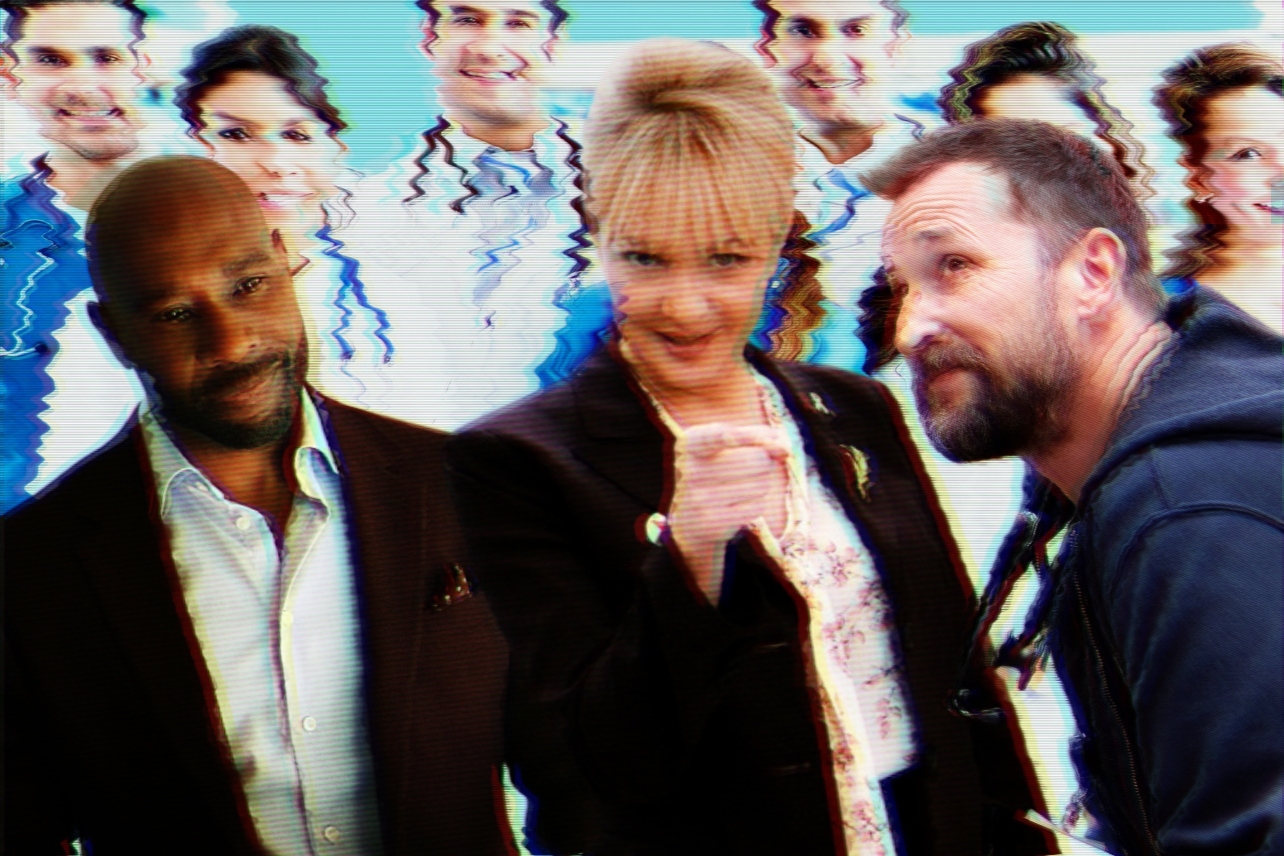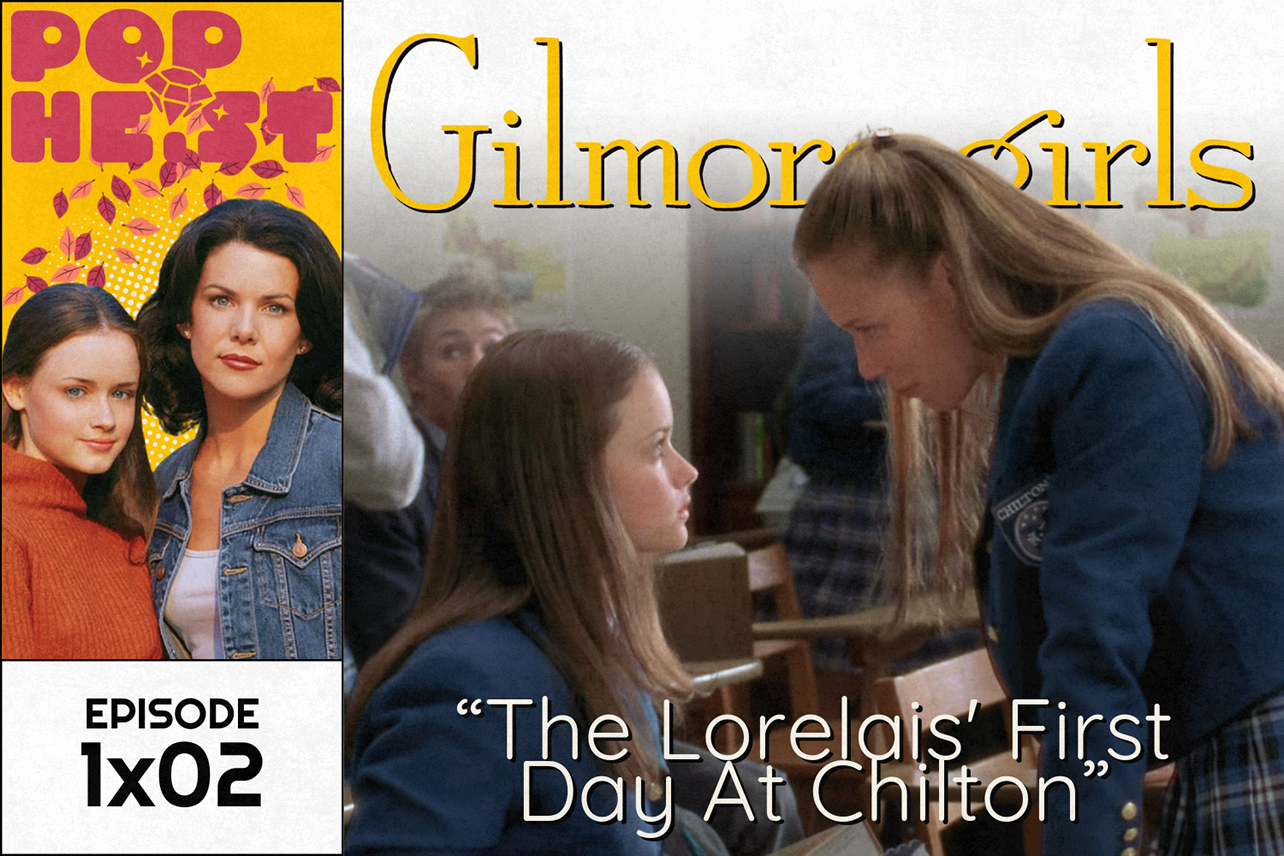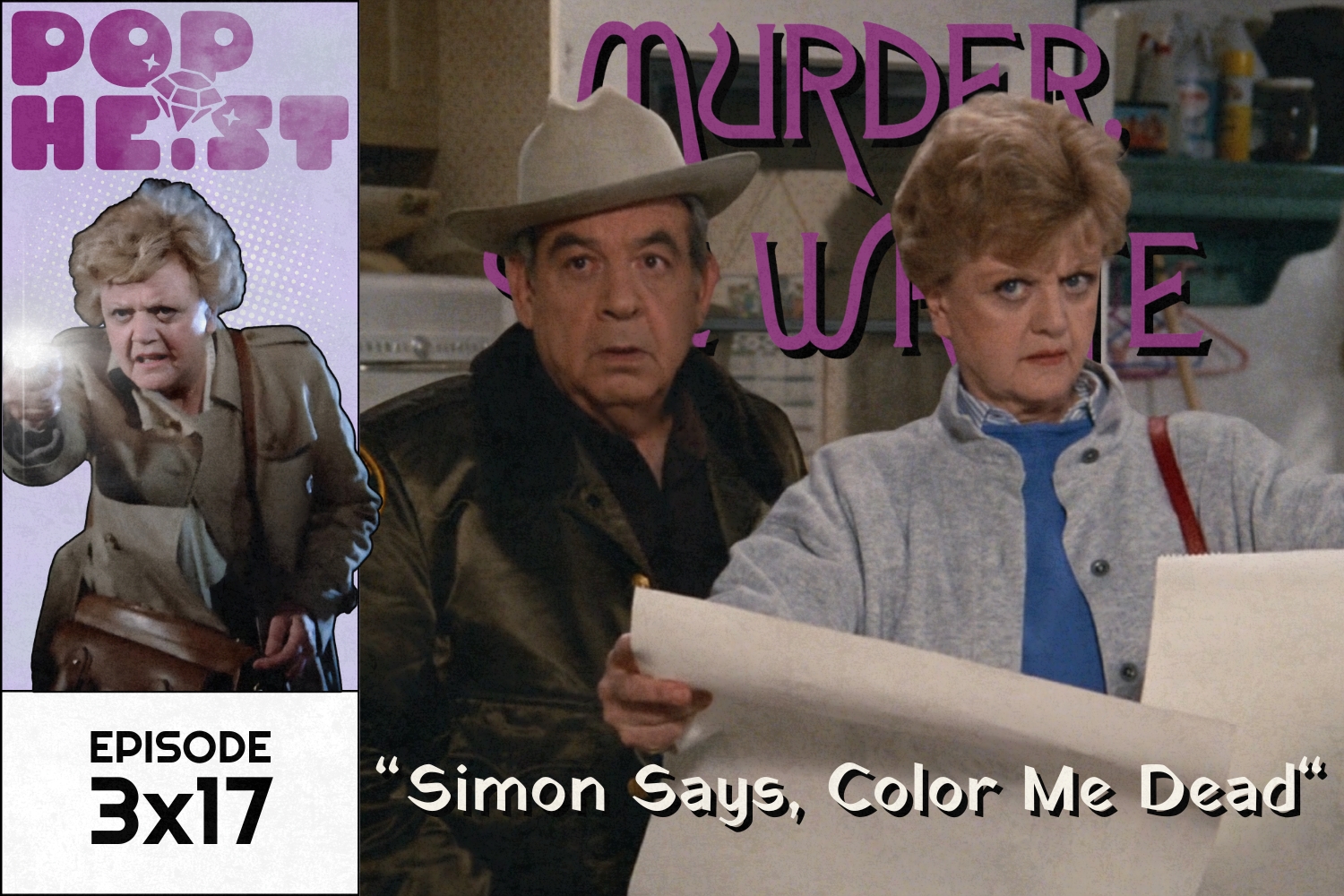It comes in cycles: every few years, America's favorite pop culture apparatus (television, obviously) heaves itself towards a new trendy bellwether. In 2018, it was witches. In 2020/2021, it was marooned teen girls. In 2022, it was vampires.
And today? We're on doctor time, baby!
To be clear, hospital shows have never not been a hot small-screen commodity. ER launched the careers of Danny Ocean and Noah Wyle As The Librarian. Grey's Anatomy has spent twenty-one years weathering every possible natural disaster and interpersonal drama that a thousand monkeys with a thousand typewriters could dream up. Scrubs made it sad to laugh, and funny to cry. New Amsterdam dared ask the question, "What if a Cool Cis Straight White Man was finally the ONE person brave enough to fix America's broken health care system???" (Complimentary.)
But the landscape this past broadcast (and streaming!) season has been something else entirely. Since September, the big networks have brought us…
- On ABC: the Joshua Jackson-starring cruise-ship soap Doctor Odyssey
- On NBC: both a stirring dramatic paean to medical genius (the Zachary Quinto-starring Brilliant Minds) and a stalwart new workplace mockumentary (St. Denis Medical)
- On CBS: the Morris Chestnut-starring "medical mystery drama," Watson
- On MAX: the real-time 24-esque adrenaline joint (AKA, Noah Wyle's ER-comeback), The Pitt
- On FOX: the diagnostic-genius-with-personality-problems-and-also-amnesia drama, Doc (AKA, "what if House, but she's a woman, and also thanks to unwisely texting while driving she has now conveniently lost all memory of both the Trump presidency and COVID?")
- And on Adult Swim, coming Sunday February 2: Common Side Effects, a new surreal-adult-animation offering about a death-curing mushroom and the evil healthcare CEOs whose profit model that would destroy.
I defy anyone to look at that list and argue we're not in a "medical TV" renaissance. So! Much! Hospital!
And not only have the majority of the major networks added a new medical show to their (often already hospital-heavy) slates, but these shows span genres. Sure, any given freshman primetime class would be expected to include line-drive medical dramas like Brilliant Minds or Doc. But a goofy, sunny Love Boat–y soap? A Parks & Rec-style small town comedy? A detective procedural literally created by the guy behind Elementary and just as literally featuring [SPOILER] as Professor Moriarty, Dr. Watson's inaugural nemesis? Plus, yeah, whatever this is going to be.
I mean, that's it! That's all of TV!
Of course, identifying the existence of a trend and identifying the social and cultural forces behind the trend are two separate questions. The second not harder than the first, necessarily. Just separate.
Like, the witchy wave of 2018? Pretty legibly a pop culture extension of the righteous sociopolitical anger that powered the shocking 2016 election results and the historic 2017 Women's March. Ditto, the Lord of the Flies-but-girls wave that followed (just with an added dash of existential derangement). As for the four new vampire shows of October 2022? It would honestly be harder to look at those explorations of alienation and loneliness stemming from a medical crisis that isolates individuals from the rest of society and not connect them with the two years of pandemic lockdown whose heels they premiered on.
In the case of our current medical wave, it's 2020 reverberating once more. Only this time it isn't the alienation and isolation of lockdown that's driving television's primetime id. Rather, it's the fact that we're at the intersection of a pair of inflection points that are bouncing off each other in reinforcing waves: on one side, the culture-shifting anti-copaganda energy that followed George Floyd's murder in May of 2020 and prompted Hollywood to rethink what stories it could tell beyond the glorification of law enforcement; and on the other, the electorate's increasingly concrete understanding of just how untenable the profit-driven motives of the American healthcare system are.
"The medical show" answers both these prompts.
Sidenote: It's arguable that the 2024–2025 season is past the sweet spot for projects that entered the development pipeline in the immediate wake of George Floyd. Brookly Nine-Nine famously scrapped the first half of its finale season scripts in the months after the 2020 protests started to pivot to a more self-aware, less "rah-rah cops!" direction, while at the same time the creators of Canadian buddy comedy Pretty Hard Cases rewrote their entire debut season to (try to) do the same. Meanwhile, FOX's Animal Control, which has made a strong case for looking to other civil servants for funny case-of-the-week storytelling possibilities, hit the small screen in 2023. But so many projects hit a bend with the 2023 WGA and SAG-AFTRA strikes, that it's just as arguable that this season is the natural inflection point.
Structurally, a hospital is the next best thing to a police precinct if you want to play around in the case-of-the-week procedural sandbox — a fact that many of the series that have premiered this year have taken full advantage of. On Doc, the core medical team isn't simply presented with a single challenging diagnosis to solve each week, à la House — that's just the B storyline. In the A arc, at least for the first half of the season, amnesiac ex-Chief of Medicine Amy Larson (Molly Parker), working her way back into full licensed doctoring privileges, is assigned to "shadow" her former colleagues as they investigate even more challenging medical mysteries — mysteries whose solutions just so happen to perfectly mirror her ever-developing sense of new-self.
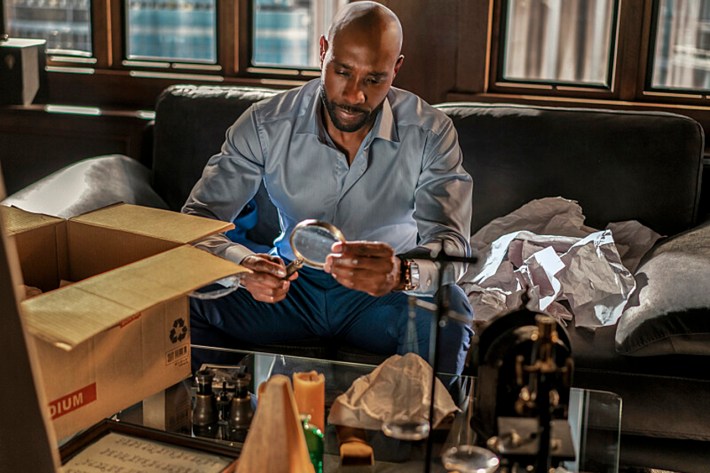
Similarly, the entire premise of FOX's Watson hinges not solely on the genuinely baffling cases Watson (Chestnut) and his team take on week to week, but more grandly on the what if…? idea that Sherlock Holmes was so secretly rich that he was able to set his best friend up with a whole boutique genetic-medical-mystery private practice after he went over the Reichenbach Falls. Naturally, Watson has staffed this bespoke clinic with young geniuses who he hopes to mold in Sherlock's image through each new medical mystery they solve.
Then on the thematic front, if you want to tell stories that respond to your audience's very real dissolution of faith and trust in the American healthcare system, you can only do that through a medical setting — because it isn't the doctors, nurses, and hospital janitors who viewers have lost faith in!
Enter: The Pitt's hyper-realistic approach to showing the minute-to-minute beats of emergency department shift life at an intensely busy Pittsburgh trauma hospital. Enter also: St. Denis Medical's comedically realistic view of the critical tediousness of managing the emergency department in small-town Merrick, OR. These two shows couldn't be more different, in terms of viewing experience. But they're aiming at the same goal, rooting their storytelling in realism to highlight the humanity of their subjects.
In The Pitt's case, that shows up in the fact that the cast attended a two-week medical skills boot camp, on the other side of which they emerged with, e.g., genuine ultrasound skills. In the case of St. Denis Medical, it manifests in the "real-life mishaps" and goofy/fraught colleagues-as-family vibes innate to small-town hospitals that showrunner Eric Ledgin leaned on when developing the series.
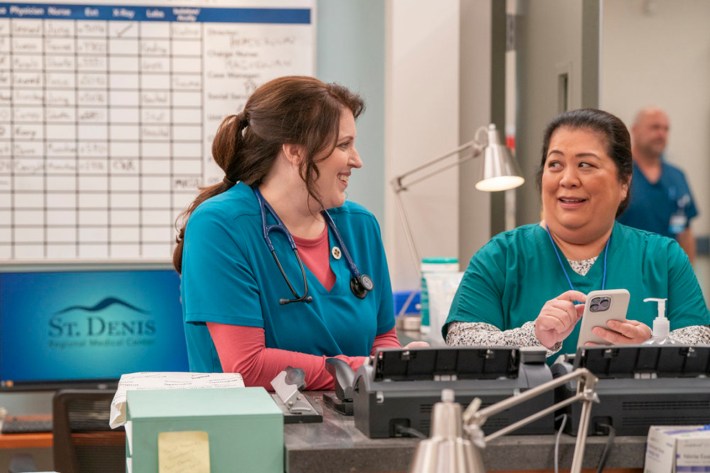
Poised — given events of the last few months — to be even more thematically potent in the combined healthcare is broken and so is the justice system sense is Adult Swim's forthcoming Common Side Effects. This surrealist animated series may not share many obvious aesthetic markers with Super Mario Bros., but it does feature both magic toadstools and a healthcare CEO who's only interested in the woes of his ailing customers insofar as those woes make him and the company ever greater profit. And helmed as it is by the combined creative forces of co-creators Joe Bennett (Scavengers Reign) and Steve Hely (Veep, 30 Rock) and producers Mike Judge and Greg Daniels (King of the Hill), Common Side Effects really feels like the cherry on top of this TV season's "everything medical is new again" cake. It's so weird! It's so on trend! And it makes the medical moment we're in so obviously inescapable.
Of course, this medical moment won't last; some new bellwether trend will soon come to take its place. But in the meantime, I hear they just renewed St. Denis Medical for Season 2 ...
